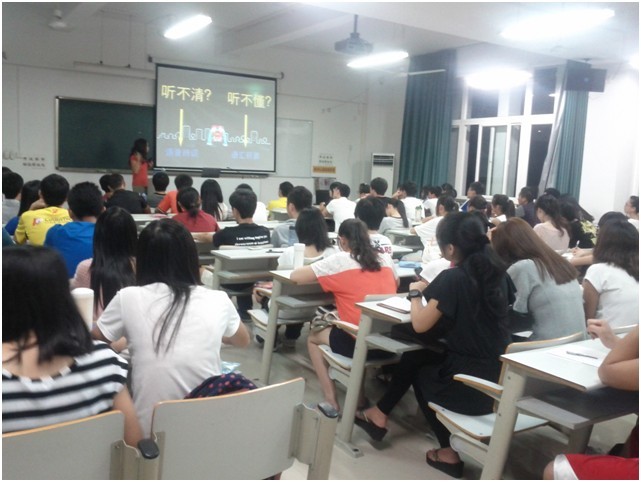 返回
教育头条
返回
教育头条

英语四级考点归纳题型讲解
下面小编跟大家一起了解英语四级考点归纳题型讲解,希望对大家的学习有所帮助。
1. Well, I've been out of touch with most of my old friends, only one or two still drop me a line occasionally.
点睛
该句中用现在完成时have been...表达了“到目前为止的某种情况”。本句需要注意的是only之后的内容,因为此部分常常是考试的重点。短语be out of touch with...的意思是“和……失去联系”,与之对应的表达是keep in touch with...,意为“与……保持联系”。如:Kate keeps in touch with her classmates by emails when she is studying abroad. 凯特在国外留学时,通过电子邮件和同学们保持联系。drop sb. a line也是听力考试中常见的表达,意为“给某人写信(通常指写一封较短的信)”。如:Don't forget to drop me a line when you get to Canada. 到加拿大后,别忘了写信给我。
2. I'm stuck in a traffic jam.
点睛
jam的本义是“果酱”,而traffic jam意为“交通堵塞”。该题主要考查短语be stuck,意思是“被困住”。由于stuck是stick的过去式,考生需要留意其发音区别。
考点归纳
考生需要特别注意常用的不规则动词。
如:与交通有关的英语表达还有:
There is heavy traffic on the road. 马路上交通拥挤。
Traffic officials have urged residents to avoid the rush hour. 交通部门要求居民避免在交通高峰时段出行。
The tunnel reduced congestion. 这条隧道缓解了交通堵塞。
3. I'm exposed to the thoughts of some of the world's best writers.
点睛
expose经常用作被动式be exposed to sth.,其实表示的是主动含义,意为“经常接触”。如:
Being exposed to the Internet, he knows a lot about e-commerce. 由于经常上网,他对电子商务十分了解。
Exposed to sunlight for too long, she suffers from skin cancer. 由于暴露在阳光下的时间太长,她患上了皮肤癌。
4. That's easier said than done.
点睛
这句话是俗语It is easier to say than to do.的变形,含义是“说起来容易,做起来难。”近几年的四级听力材料中频繁出现一些常见的习语和俗语,如果考生不了解,就可能会出现理解问题。比如needle in a haystack这个习语,意思是“大海捞针”,不能理解为“在稻草堆里发现一根针”。
考点归纳
其他常用的俗语还有:
The early bird catches the worm. 早起的鸟儿有虫吃。
A stitch in time saves nine. 一针不缝,九针难补。
A friend in need is a friend indeed. 患难见真情。
Actions speak louder than words. 行动胜过言辞(事实胜于雄辩)。
Better to do well than to say. 说得好不如做得好。
Don't count your chicken before they are hatched. 别高兴得太早了。
Great minds think alike. 英雄所见略同。
To say is one thing and to do is another. 说归说,做归做。
Where there is a will, there is a way. 有志者,事竟成。
5. We'll have to count on good weather.
点睛
count on意为“依赖,信任”,相当于count upon。如:
1) If I were you, I wouldn't count on it. 如果我是你,我就不抱有希望。
2) He counted on his sister for everything. 他凡事都指望姐姐。
考点归纳
注意count一词的用法。
count的本义是“数(数)”。如:
Please wait for me, I have to count my students. 请等我一会儿,我得点一下学生的人数。
count还可意为“有重要性,有意义”。这个用法考生通常容易忽视,但实际上在口语中经常用到。如:
Make every day count. 认真过好每一天。
6. You took an optional course this semester, didn't you?
点睛
对于社会文化类的听力材料,掌握一定的文化背景知识是听懂的关键。本句中optional course指的是大学里的“选修课”。与学校生活有关的单词和短语还有:
考点归纳
本句是一个反意疑问句,其中的didn't you是英文与中文的表达习惯有明显差别的部分,译成中文是“是吗?”反意疑问句在语调上可以是升调,也可以是降调,两种语调表示的语义是不一样的。如:
Good weather, isn't it? (降调)天气不错,是吧?(此时问话人并不期待听话人作答,而意在打开话题,以便进一步聊天。)
You like this dress, don't you? (升调)你喜欢这条裙子,是不是?(此时问话人意在询问意见,期待听话人作答。需要注意的是,如果回答是yes,就是肯定反意疑问句的前半句;反之,则是否定。)
7. It seems like the more the professor talks, the less I understand.
点睛
本句中的the more...the less...为句型“the+形容词比较级...the+形容词比较级”(越……越……)的变体。

这个句型由于前后两部分相隔较远,因此需要考生在听到前半部分内容的时候就留意是否有后半部分。如:
The more he earns, the more he wants. 他赚的钱越多,就越想要更多的钱。
The sooner you start, the more quickly you'll finish. 你开始得越早,完成得就越快。
Actually, the busier he is, the happier he feels. 事实上,他越忙就越高兴。
同时,“the+形容词比较级...,the+形容词比较级”句型还可以省略部分内容。如:
The sooner this is done, the better. 这件事完成得越快越好。
8. It's worthwhile to make the effort.
点睛
worthwhile意为“值得”该词在句中指的是“值得花时间或精力去做某事”。如果不熟悉这个词,很容易把它听成worth while,这就要求考生在听的时候注意整个句子的意思和结构。make an/the effort to意为“努力,设法,企图”,后可接动词不定式,也可不接任何内容,如本句。
考点归纳
像worthwhile这样由两个完整的单词组成的复合词,听的时候需要考生自己判断是一个词还是两个词。如:meanwhile(同时),otherwise(否则),wristwatch(腕表)等。worthwhile在使用时,若句子的主语为不定式或者动名词,就要用it is worthwhile结构,该词常用作表语或定语。另外,worth while分开使用时,其常用结构为It is worth while doing sth.或It is worth (one's) while to do sth.,这时while意为“费时”,即做一件事情花费的时间、努力或工夫。如:
It is worthwhile to read his new book. 他的新书值得一看。
It is worth while seeing the film. 这部电影值得花时间去看看。
It is worth your while to see the film. 这部电影值得你花点时间去看。
9. There is every reason to believe the trend will continue through the next few decades.
点睛
there is every reason to do sth.意为“有充分的理由做某事”,与have every reason for/to do sth.相近。如:I have every reason to stay in my own house. 我有充分的理由待在我自己的房子里。
decade意为“十年,十年间”,而表示“数十年”可用其复数形式decades。
考点归纳
听力考试中类似decade的数词还有:dozen(一打,12个),score(20),这两个词在用法上有相似性。
dozen和score的前面有数词修饰时,一般不用复数。如:
1) three dozen eggs 三打鸡蛋
2) They bought two score bottles of the beer. 他们买了40瓶啤酒。
当dozen和score表示“许多,大量”等数量上的泛指时,要用复数形式,即dozens/scores of。如:
dozens of times 几十次scores of years ago 许多年前
与a few, some, several, many等表示不确定数量的词连用时,dozen和score常用复数形式,且后面要加of。如:
some dozens of people 几十个人many scores of cattle 许多家畜
若修饰代词或有the, these, those等限定词时,dozen和score之后要加介词of。如:
a dozen of these oranges 一打橙子four score of them 他们中的80个
10. I had no idea that it closes so early on weekends.
点睛
I have no idea是“我不知道”的意思,与I don't know含义相同。I have no idea的后面可以像本句一样接从句,也可以什么都不接,用于回答别人的问话。
考点归纳
英语中有一些表达偏向于用名词而不用动词。如:如果要说“我的舞跳得不好”,口语里很少用I don't dance well.而是说I'm not good at dancing.或I am not a good dancer.又如“我歌唱得不太好”,就可以说I am not a good singer.
1. Well, I've been out of touch with most of my old friends, only one or two still drop me a line occasionally.
点睛
该句中用现在完成时have been...表达了“到目前为止的某种情况”。本句需要注意的是only之后的内容,因为此部分常常是考试的重点。短语be out of touch with...的意思是“和……失去联系”,与之对应的表达是keep in touch with...,意为“与……保持联系”。如:Kate keeps in touch with her classmates by emails when she is studying abroad. 凯特在国外留学时,通过电子邮件和同学们保持联系。drop sb. a line也是听力考试中常见的表达,意为“给某人写信(通常指写一封较短的信)”。如:Don't forget to drop me a line when you get to Canada. 到加拿大后,别忘了写信给我。
2. I'm stuck in a traffic jam.
点睛
jam的本义是“果酱”,而traffic jam意为“交通堵塞”。该题主要考查短语be stuck,意思是“被困住”。由于stuck是stick的过去式,考生需要留意其发音区别。
考点归纳
考生需要特别注意常用的不规则动词。
如:与交通有关的英语表达还有:
There is heavy traffic on the road. 马路上交通拥挤。
Traffic officials have urged residents to avoid the rush hour. 交通部门要求居民避免在交通高峰时段出行。
The tunnel reduced congestion. 这条隧道缓解了交通堵塞。
3. I'm exposed to the thoughts of some of the world's best writers.
点睛
expose经常用作被动式be exposed to sth.,其实表示的是主动含义,意为“经常接触”。如:
Being exposed to the Internet, he knows a lot about e-commerce. 由于经常上网,他对电子商务十分了解。
Exposed to sunlight for too long, she suffers from skin cancer. 由于暴露在阳光下的时间太长,她患上了皮肤癌。
4. That's easier said than done.
点睛
这句话是俗语It is easier to say than to do.的变形,含义是“说起来容易,做起来难。”近几年的四级听力材料中频繁出现一些常见的习语和俗语,如果考生不了解,就可能会出现理解问题。比如needle in a haystack这个习语,意思是“大海捞针”,不能理解为“在稻草堆里发现一根针”。
考点归纳
其他常用的俗语还有:
The early bird catches the worm. 早起的鸟儿有虫吃。
A stitch in time saves nine. 一针不缝,九针难补。
A friend in need is a friend indeed. 患难见真情。
Actions speak louder than words. 行动胜过言辞(事实胜于雄辩)。
Better to do well than to say. 说得好不如做得好。
Don't count your chicken before they are hatched. 别高兴得太早了。
Great minds think alike. 英雄所见略同。
To say is one thing and to do is another. 说归说,做归做。
Where there is a will, there is a way. 有志者,事竟成。
5. We'll have to count on good weather.
点睛
count on意为“依赖,信任”,相当于count upon。如:
1) If I were you, I wouldn't count on it. 如果我是你,我就不抱有希望。
2) He counted on his sister for everything. 他凡事都指望姐姐。
考点归纳
注意count一词的用法。
count的本义是“数(数)”。如:
Please wait for me, I have to count my students. 请等我一会儿,我得点一下学生的人数。
count还可意为“有重要性,有意义”。这个用法考生通常容易忽视,但实际上在口语中经常用到。如:
Make every day count. 认真过好每一天。
6. You took an optional course this semester, didn't you?
点睛
对于社会文化类的听力材料,掌握一定的文化背景知识是听懂的关键。本句中optional course指的是大学里的“选修课”。与学校生活有关的单词和短语还有:
考点归纳
本句是一个反意疑问句,其中的didn't you是英文与中文的表达习惯有明显差别的部分,译成中文是“是吗?”反意疑问句在语调上可以是升调,也可以是降调,两种语调表示的语义是不一样的。如:
Good weather, isn't it? (降调)天气不错,是吧?(此时问话人并不期待听话人作答,而意在打开话题,以便进一步聊天。)
You like this dress, don't you? (升调)你喜欢这条裙子,是不是?(此时问话人意在询问意见,期待听话人作答。需要注意的是,如果回答是yes,就是肯定反意疑问句的前半句;反之,则是否定。)
7. It seems like the more the professor talks, the less I understand.
点睛
本句中的the more...the less...为句型“the+形容词比较级...the+形容词比较级”(越……越……)的变体。

这个句型由于前后两部分相隔较远,因此需要考生在听到前半部分内容的时候就留意是否有后半部分。如:
The more he earns, the more he wants. 他赚的钱越多,就越想要更多的钱。
The sooner you start, the more quickly you'll finish. 你开始得越早,完成得就越快。
Actually, the busier he is, the happier he feels. 事实上,他越忙就越高兴。
同时,“the+形容词比较级...,the+形容词比较级”句型还可以省略部分内容。如:
The sooner this is done, the better. 这件事完成得越快越好。
8. It's worthwhile to make the effort.
点睛
worthwhile意为“值得”该词在句中指的是“值得花时间或精力去做某事”。如果不熟悉这个词,很容易把它听成worth while,这就要求考生在听的时候注意整个句子的意思和结构。make an/the effort to意为“努力,设法,企图”,后可接动词不定式,也可不接任何内容,如本句。
考点归纳
像worthwhile这样由两个完整的单词组成的复合词,听的时候需要考生自己判断是一个词还是两个词。如:meanwhile(同时),otherwise(否则),wristwatch(腕表)等。worthwhile在使用时,若句子的主语为不定式或者动名词,就要用it is worthwhile结构,该词常用作表语或定语。另外,worth while分开使用时,其常用结构为It is worth while doing sth.或It is worth (one's) while to do sth.,这时while意为“费时”,即做一件事情花费的时间、努力或工夫。如:
It is worthwhile to read his new book. 他的新书值得一看。
It is worth while seeing the film. 这部电影值得花时间去看看。
It is worth your while to see the film. 这部电影值得你花点时间去看。
9. There is every reason to believe the trend will continue through the next few decades.
点睛
there is every reason to do sth.意为“有充分的理由做某事”,与have every reason for/to do sth.相近。如:I have every reason to stay in my own house. 我有充分的理由待在我自己的房子里。
decade意为“十年,十年间”,而表示“数十年”可用其复数形式decades。
考点归纳
听力考试中类似decade的数词还有:dozen(一打,12个),score(20),这两个词在用法上有相似性。
dozen和score的前面有数词修饰时,一般不用复数。如:
1) three dozen eggs 三打鸡蛋
2) They bought two score bottles of the beer. 他们买了40瓶啤酒。
当dozen和score表示“许多,大量”等数量上的泛指时,要用复数形式,即dozens/scores of。如:
dozens of times 几十次scores of years ago 许多年前
与a few, some, several, many等表示不确定数量的词连用时,dozen和score常用复数形式,且后面要加of。如:
some dozens of people 几十个人many scores of cattle 许多家畜
若修饰代词或有the, these, those等限定词时,dozen和score之后要加介词of。如:
a dozen of these oranges 一打橙子four score of them 他们中的80个
10. I had no idea that it closes so early on weekends.
点睛
I have no idea是“我不知道”的意思,与I don't know含义相同。I have no idea的后面可以像本句一样接从句,也可以什么都不接,用于回答别人的问话。
考点归纳
英语中有一些表达偏向于用名词而不用动词。如:如果要说“我的舞跳得不好”,口语里很少用I don't dance well.而是说I'm not good at dancing.或I am not a good dancer.又如“我歌唱得不太好”,就可以说I am not a good singer.
以上就是教育宝头条带来的英语四级考点归纳题型讲解详细介绍,想要查看更多四级六级考试资讯,敬请关注教育宝头条,也可以加我微信18560125702,我会解答你的学习问题。返回教育宝头条
【免责声明】本文仅代表作者本人观点,与教育宝无关。教育宝对文中陈述、观点判断保持中立,不对所包含内容的准确性、可靠性或完整性提供任何保证。请读者仅作参考,特此声明!





